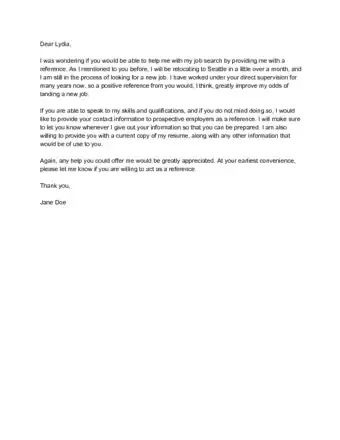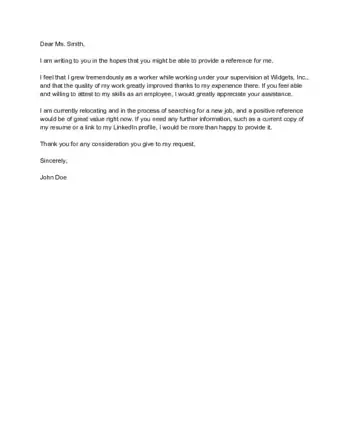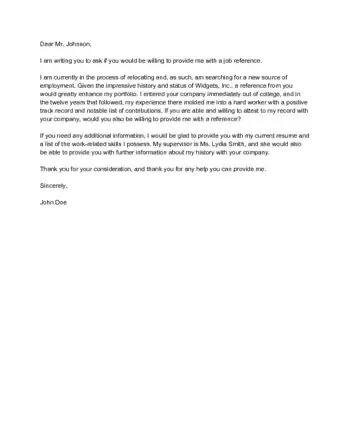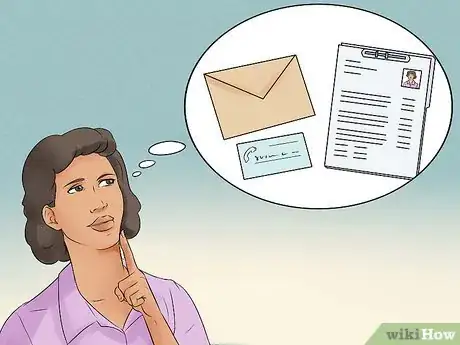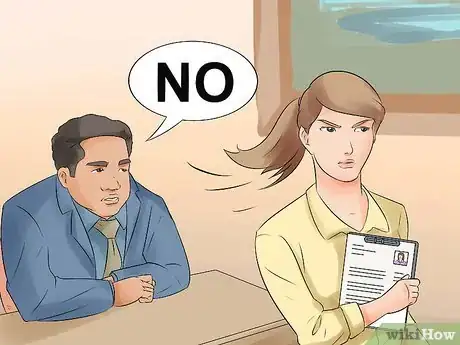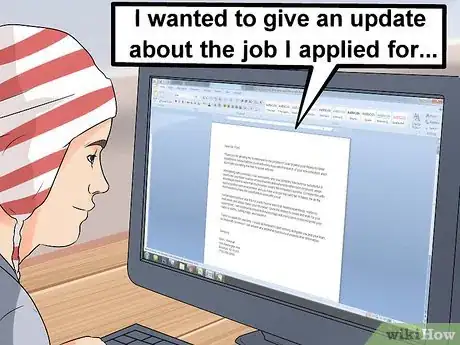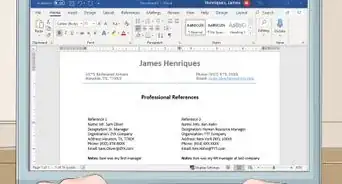This article was co-authored by Alyson Garrido, PCC. Alyson Garrido is an International Coach Federation accredited Professional Certified Coach (PCC), Facilitator, and Speaker. Using a strengths-based approach, she supports her clients with job search and career advancement. Alyson provides coaching for career direction, interview preparation, salary negotiation, and performance reviews as well as customized communication and leadership strategies. She is a Founding Partner of the Systemic Coach Academy of New Zealand.
This article has been viewed 60,209 times.
When looking for jobs or applying to schools, you'll most likely need references. Getting a reference can be as easy as asking for one. However, if you want a strong reference (hint: you do), you’ll need to put forth a little extra effort. Getting a strong reference requires careful preparation and shrewd communication with your potential referees.
Steps
Sample Letter of Reference Requests
Preparing Yourself
-
1Determine the type of references you need. There different types of references, depending on the position for which you’re applying. References can also take one of several forms. Phone calls, emails, questionnaires, and letters of recommendation are all common. Be sure to review the applications instructions carefully to make sure that you secure the right kind of reference.
- The most common type of reference is a professional reference. In this case, your referee should be able to attest to your ability to get the job done.
- Another common type of reference is a personal reference. In this case, your referee should be able to attest to your character.
- If you have a LinkedIn profile, you have the option of obtaining a LinkedIn recommendation.
-
2Pick the right people. Different reference types often require people to serve as referees. Make sure that the person you’re asking can provide you with kind of reference you need. Ask yourself, “Who will be most able to discuss my qualifications for this position?”
- Don’t limit yourself to former or current employers. Co-workers, former teachers and professors, ministers, and even your attorney might be able provide you with a strong reference.[1]
- If you’re applying for multiple positions, consider asking different people to serve as referees for different positions.[2]
- Make a list of reasons why you’re asking a particular person to be a referee for you. Include details like the basis and extent of his or her relationship with you, his or her professional qualifications, and the kinds of things he or she will be able to say about you. Not only will this list help you narrow down your list of potential referees, it will also come in handy when you actually ask for references.
EXPERT TIPAlyson Garrido is an International Coach Federation accredited Professional Certified Coach (PCC), Facilitator, and Speaker. Using a strengths-based approach, she supports her clients with job search and career advancement. Alyson provides coaching for career direction, interview preparation, salary negotiation, and performance reviews as well as customized communication and leadership strategies. She is a Founding Partner of the Systemic Coach Academy of New Zealand.Career Coach
 Alyson Garrido, PCC
Alyson Garrido, PCC
Career CoachKeep up with professional contacts you might want to use later for a reference. As you build professional relationships, make it a priority to keep in touch with those people regularly. For instance, you might send an annual email, or you might stop by the office when you're in town. The same people who helped you early on will be able to help you throughout your career, so that's a great way to start building your professional network.
Advertisement -
3Update your resume. This might seem like a no-brainer. However, you’re going to want to provide your potential referees with useful information about yourself. An updated resume will serve them better than an out-of-date one.
Asking Your Referees
-
1Ask early. Your referees, should they agree to be your referees, are doing you a favor. Give them at least two weeks to prepare and, if necessary, write you a letter of recommendation.
-
2Decide how you will ask. There is some disagreement about the best way to ask someone to be a reference. Asking someone in person or over the phone is more personal, but you run the risk of making someone uncomfortable.[3] Asking someone in an email is less personal, but it gives the person a chance to consider the request.[4] Use your best judgment.
- Whether you ask for a reference in person, on the phone, or in an email, give the potential referee the option of saying “no.” Ask the potential referee, “Do you feel that you are able to give me a strong reference?” If a potential referee does in fact say “no,” be grateful. It’s far better to have someone who really wants give you a reference on your side.[5]
- Be polite. Let your potential referees know how much you appreciate their efforts. And let them know that you’re available to answer any questions they might have.
-
3Tell your referees about the position. Supply them with job ad itself. You should also come up with your own description of the position.
-
4Explain why you’re asking them. Remember the lists you made when you were deciding who to ask? Now’s the time to use those lists again. Make an effort to draw connections between your potential referee’s qualifications and the position for which you’re applying. For example, you might say, "Since you are a successful business owner, I thought that Business University's School of Business would value your opinion of me."
-
5Offer a guide. Be very upfront about what you want your referees to say about you. You might say something along the following lines: “Given our history, I think you’re the right person to talk about my abilities in these areas…”
- You can offer them anything from a simple list to a full-blown draft of a letter of recommendation. The more specific and thorough you are, the more grateful your referees will be.
- Give your referees explicit permission to add or delete parts of your guide as they see fit. This will let your referees know that you trust their judgement. You can say, “This is just a guide. I hope that you will make whatever changes you think are necessary.”
-
6Give your referees a copy of your resume. Remember: an updated resume is far more useful than an out-of-date one.
-
7Follow up. Once you’ve submitted your application materials, be sure to send thank-you notes, and keep your referees in-the-loop about the progress of your job search. A quick email that begins, “I wanted to give an update about the job I applied for.”
- Whether or not you end up getting the position for which you applied, maintaining contact with your referees is a smart idea. You might need to call on them to provide references for other applications. And they might be able to alert you to job openings.
References
- ↑ http://www.careercast.com/career-news/job-reference-etiquette-how-get-recommended Job Reference Etiquette
- ↑ http://www.careerealism.com/asking-for-reference-steps/ Asking for a Reference
- ↑ http://www.careerealism.com/asking-for-reference-steps/ Asking for a Reference
- ↑ https://www.wikihow.com/Ask-for-a-Reference-from-an-Employer Ask for a Reference
- ↑ https://hbr.org/2010/04/how-to-ask-for-a-reference-let-1-2/ How to Ask for a Reference
- ↑ http://www.careerealism.com/asking-for-reference-steps/ Asking for a Reference
- ↑ http://www.careercast.com/career-news/job-reference-etiquette-how-get-recommended Job Reference Etiquette
- ↑ http://www.careerealism.com/asking-for-reference-steps/ Asking for a Reference
About This Article
To ask for a reference, determine what kind you need, like a professional or personal reference, and choose the appropriate person to ask. Next, decide if asking in person, via email, or during a phone call makes the most sense, depending on location and your relationship. Then, get in touch with them and politely explain what you need, why you need it, and why they're the best person to ask. For tips on phrasing the request so the person doesn't feel pressured, read on!
